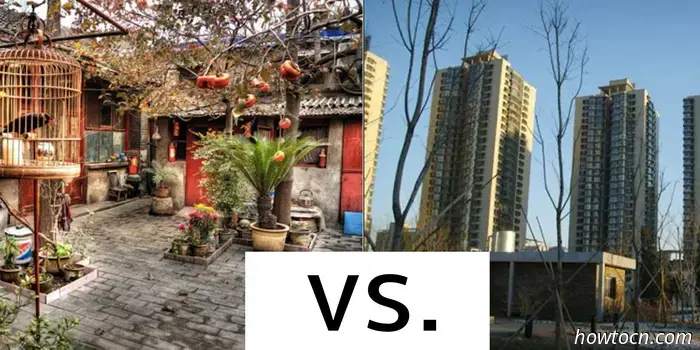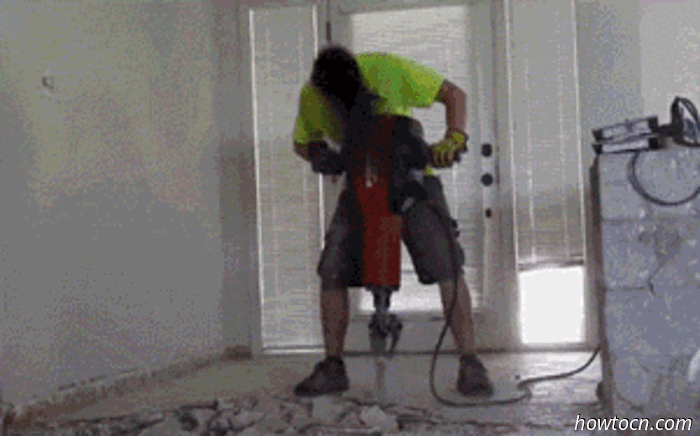
It's a question as old as the first skyscraper in Beijing. It disturbs our sleep and catches us off guard while dining, during meetings, and even at the gym, leading us into a maze of uncertainty. Of course, that question is:
“Who has it better: hutong residents or high-rise inhabitants?”
But when it comes to answering this, who can we rely on? As someone who has lived in various places in Beijing, including two high-rises and two hutong homes, I will attempt to settle this matter and highlight the pros and cons of both.
**Temperature**
The intense heat of summer and the biting cold of winter is a topic that never gets old—especially for complaining. Shielding yourself from the elements is certainly easier in an apartment building, where you are more likely to have double-glazed windows or ones that are in better condition. Hutong apartments are notorious for their poor insulation, so if your place hasn't been renovated in a while, you might need to invest in a heater, bundle up in layers, and insulate your windows with plastic to stave off the chill. In the summer, however, expect to blast the air conditioner loudly enough to disturb your neighbors, which leads us to...
**Sound**
While it varies by building, high-rises generally offer better sound insulation. Many hutong homes are divided into smaller studio apartments with notoriously thin (and often illegal) partition walls, meaning you will hear your neighbors quite frequently. On the flip side, if your unit is tucked away in a courtyard and removed from busy streets, it might be insulated from the city's noise, with only the pleasant chirping of your neighbor's birds or the cooing of pigeons to wake you. Nonetheless, it’s advisable to inquire about noise levels during your apartment viewing and to pay attention to the sounds yourself.
**Neighbors**
There isn’t much to say about neighbors in high-rise apartments. They seem to vanish the moment you step out of the elevator or staircase, allowing you to live in the same building for years without ever meeting anyone. Researchers have debated the societal drawbacks of not forming personal connections within your community, but given China’s increasing emphasis on privacy, it appears that apartments are here to stay.
Conversely, neighbors in hutongs tell a different tale. If you reside in a hutong, you will likely be living next to some long-time Beijing residents who won’t hesitate to inquire about your rent. With their charmingly thick accents and tendency to dry corn, cabbages, and sweet potatoes in shared spaces, the daily interactions create a delightful backdrop for life in Beijing—or perhaps characters for your future memoir. Keep your neighbors close, master the art of stating the obvious (“您回来了 nín huíláile!”), and you're bound to enjoy a wonderful communal living experience.
**Light**
Bad news for those with a green thumb who prefer to stay close to the ground: hutong apartments usually lack sufficient light for regular plants (unless you’re fortunate enough to have a century-old tree in the courtyard), and it might be a bit dim for you too. If you do find yourself in a bright space, you're likely on the second or third floor, so be sure to contact your landlord quickly to confirm your apartment doesn’t face demolition for code violations.
In contrast, high-rises typically offer ample light, especially if you have a spacious balcony, enabling both your plants and your spirit to thrive. Waking to sunshine streaming in is still considered a blessing, right?
**Accessibility**
When you're staring at a subway map in one of Beijing's basements or dodging the constant flow of buses above ground, the city seems well-connected. However, getting anywhere on your own can be a different story. We advocate cycling (or scootering) around town, and living in a hutong can save you time since you won’t have to spend ten minutes hiking up to your apartment from the street level. That said, if you prefer walking, navigating from the maze-like alleys to a main road can take some time, which could also become a hassle when moving residences.
Moreover, the potholes, sand mounds, roaming hutong dogs, and scattered small children can pose challenges for those unable to see well in the dark or react quickly. Only the seasoned Beijingers, who have walked the same path for years, know their way around. The rest of us risk injury as we stumble through the night.
High-rise apartments, however, offer protection from such hazards, thanks to noise-sensitive stairwell lights, paved walkways, and, in some cases, better access to subways. Additional advantages often include spacious elevators and underground parking for both bikes and vehicles.
**Price**
Old hutong courtyards are vanishing rapidly, and those left are frequently being transformed into luxurious residences (think RMB 12,000 and above), putting them out of many people's reach. The WeChat feeds of hutong-focused








It's a long-standing debate that every Beijinger encounters at least once: which is superior, hutongs or high-rise apartments?